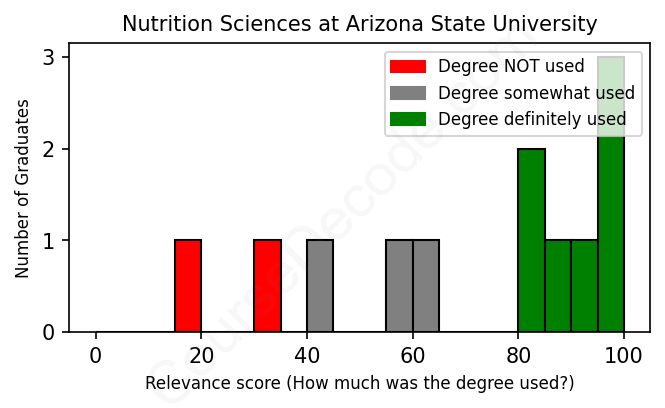
First, some facts. Of the Nutrition Sciences graduates from Arizona State University we've analyzed , here's how many have used (or NOT used) their degree in their career:

These are estimates based on AI analysis of 12 LinkedIn profiles (see below).
The verdict? Slightly above average. Overall, with an average relevance score of 70%, Nutrition Sciences graduates from Arizona State University have a slightly higher likelihood (+3%) of finding work in this field compared to the average graduate across all fields:
And for comparison, here's the chart for all profiles we've looked at across all degrees.
Also, after graduating, only 25% of these graduates have pursued further education other than another Bachelor's degree (such as a Masters degree or other), compared to the average across all profiles of 35%. This suggests a Bachelors degree is enough for most Nutrition Sciences graduates, and it's normal to look for work straight after graduation.
See the details:
|
Relevance score: 42% We think this person has gone into a career only somewhat relevant to their degree. We think this person has gone into a career only somewhat relevant to their degree.
DEGREE INFOGraduated in 2018 from Arizona State University with a Bachelor's degree in Nutrition Sciences. No other secondary education since. JOB HISTORY SINCE GRADUATIONAu Pair Au Pair International Sep 2018 - Dec 2018 Behavioral Health Technician  Caraval Autism Health Jun 2018 - 2019 Classroom Counselor  Camelot Education 2018 - 2020 Special Education Specialist  Acacia Academy & The Achievement Centers, Inc. Jan 2021 - Jul 2021 Resource Specialist  NowPow Jun 2021 - Mar 2022 Instructional Designer  NowPow Aug 2021 - Mar 2022 User Education Specialist  Unite Us Apr 2022 - Present ABOUTExperienced professional with a demonstrated history of working in education, technology, instructional design and learning/development. Highly knowledgeable in all instructional design and training principles. Lover of all things education, food, & fashion. |
The top 10 most common jobs done by the graduates we've analyzed (ranked most common to least) are:
From analyzing the LinkedIn profiles of graduates with a degree in Nutrition Sciences from Arizona State University, it’s clear that many of them have pursued careers closely related to their studies. A significant number have secured positions as Registered Dietitians or Clinical Dietitians, where they effectively apply their knowledge of nutrition daily. These roles involve creating dietary plans, providing nutrition education, and working in various healthcare settings, which aligns perfectly with the core elements of their degree. Other common jobs include Nutritionists and Health Coaches, both of which also emphasize skills and knowledge grounded in nutrition sciences.
However, not all positions are strongly related to Nutrition Sciences. Some graduates have ventured into roles such as Physician Assistants, Project Coordinators, and even managerial positions in food service, which do not require the specialized knowledge gained in their Nutrition degree. While these roles may occasionally touch on nutrition or health, they primarily focus on skills unrelated to nutrition. So, while there’s a substantial connection for many graduates in terms of job relevance, a notable number have drifted into fields where their degree may not be fully utilized. It’s a mixed bag, but the strongest path remains centered around dietetic and nutritional roles, which showcase the degree’s true value and application in real-world settings.
Here is a visual representation of the most common words in job titles for Nutrition Sciences graduates (this is across all Nutrition Sciences graduates we've analyzed, not just those who went to Arizona State University):

When looking at the career trajectories of graduates with a degree in Nutrition Sciences from Arizona State University, a clear pattern emerges. Many of these graduates start off in roles closely related to nutrition, such as registered dietitians or in clinical dietitian positions, right after graduation. It's common to see them taking positions that allow them to gain experience in the field, especially in healthcare settings and public health. For instance, graduates from the earlier classes often landed roles as nutritionists or dietitians shortly after completing their degrees, reflecting a solid entry into careers directly aligned with their education.
As they progress five to ten years down the line, many graduates tend to remain in the nutrition and healthcare sector, climbing the ladder into more specialized roles or management positions. You'll notice that several who started as dietitians move up to more senior roles, such as clinical specialists or managers, indicating that a degree from ASU leads to successful and relevant career paths in this field. However, there are also examples where some graduates shifted focus entirely, with a few moving into sales, education, or administrative roles. This shows that while the degree lays a foundation for a stable and relevant career in nutrition, not everyone stays strictly within that guideline, which can be a mixed bag depending on personal choices and opportunities encountered along the way.
So, a Bachelor's degree in Nutrition Sciences, whether at Arizona State University or somewhere else, can be a bit of a mixed bag in terms of difficulty. On one hand, if you enjoy science—like biology and chemistry—and have an interest in how food impacts health, you'll probably find some parts of the coursework pretty engaging. But, there are also some challenging classes, especially if you're diving into the details of metabolism and nutrient interactions. Overall, it's not the easiest degree out there, but it isn't the hardest either; a solid work ethic and a genuine curiosity about nutrition can definitely make the experience more manageable. Just be ready to hit the books and stay organized!
Most commonly, in the LinkedIn profiles we've looked at, it takes people 4 years to finish a Bachelor degree in Nutrition Sciences.
Looking at these Nutrition Sciences grads from Arizona State University, it seems like they’ve varied a bit in their financial journeys. Some of the earlier graduates like the ones from 2012 and 2013 landed pretty solid dietitian roles, which usually pay well, especially in healthcare settings. The later grads from 2020 and 2022 seem to be starting out in roles that might not pay as high, like teaching and assistant positions. So, overall, while some of them have likely been able to make decent money, especially those sticking with registered dietitian paths, others are still climbing the ladder and may be in jobs that aren’t quite as lucrative yet. In a nutshell, it’s a mixed bag, but those working in hospitals and healthcare are probably doing better financially.
Here is a visual representation of the most common words seen in the "about" section of LinkedIn profiles who have a Bachelor degree in Nutrition Sciences (this is across all Nutrition Sciences graduates we've analyzed, not just those who went to Arizona State University). This may or may not be useful:

Here are all colleges offering a Bachelor degree in Nutrition Sciences (ordered by the average relevance score of their Nutrition Sciences graduates, best to worst) where we have analyzed at least 10 of their graduates:
| College | Score | Count |
|---|---|---|
 University of Connecticut University of Connecticut
|
85 | 11 |
 Penn State University Penn State University
|
76 | 13 |
 California Polytechnic State University-San Luis Obispo California Polytechnic State University-San Luis Obispo
|
75 | 12 |
 University of New Hampshire University of New Hampshire
|
71 | 10 |
 Arizona State University Arizona State University
|
70 | 12 |
 Texas A&M University Texas A&M University
|
70 | 19 |
 The University of Texas at Austin The University of Texas at Austin
|
60 | 21 |
 Montclair State University Montclair State University
|
59 | 10 |
 Kaplan University Kaplan University
|
54 | 12 |
 University of Arizona University of Arizona
|
46 | 20 |